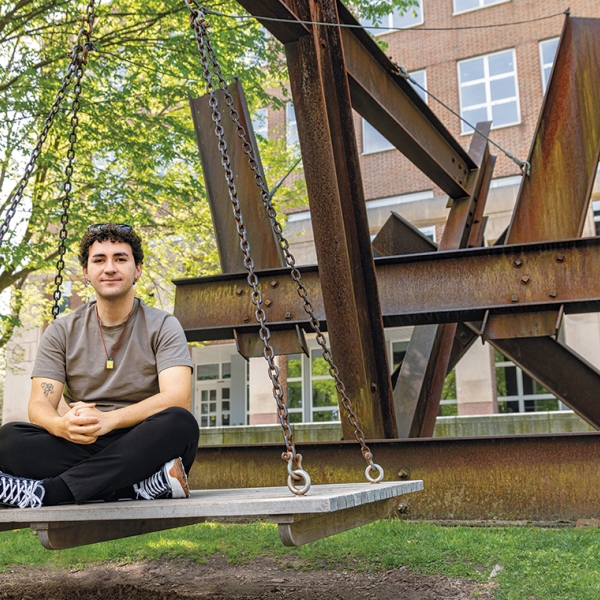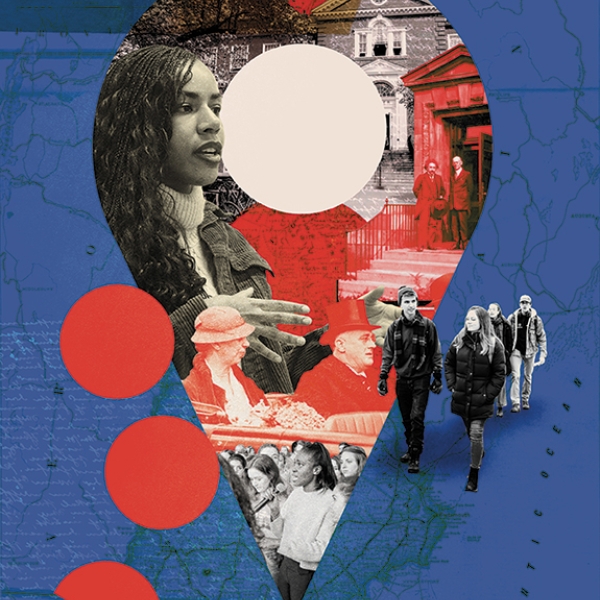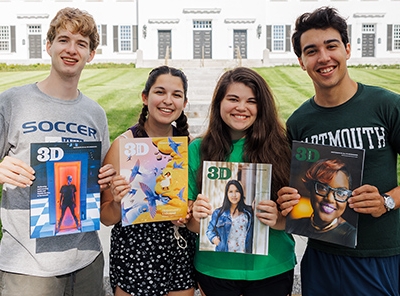Innovating For Impact

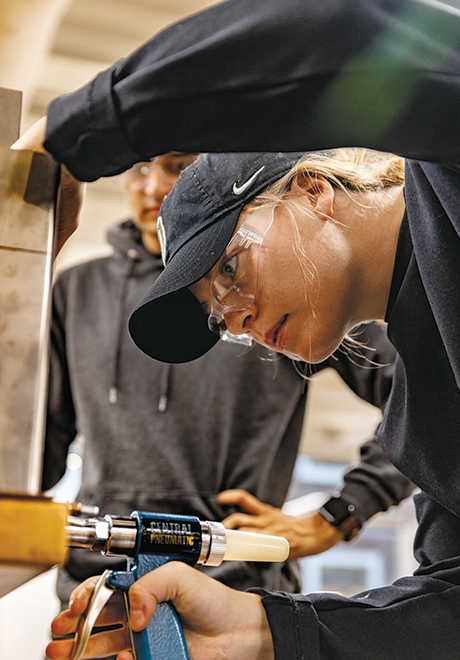
Dartmouth College hums with innovative spirit. In dynamic, cutting-edge labs and classrooms, students and faculty translate their ideas on how to solve problems into reality. They push for their discoveries and inventions to move the needle and make a difference. At her inauguration in September 2023, President Sian Leah Beilock cited innovation with impact as one of the five key pillars of her vision on how to move Dartmouth forward.
"The complex problems facing the world today demand urgent, sophisticated solutions, making our push for discovery and breakthrough innovation ever more vital," President Beilock said in remarks delivered from a podium on the Dartmouth Green. "These problems also need leaders who have an understanding of the human condition, of history, and of the value of interpersonal relationships."
"We know that the biggest issues—health care, climate, growing economic inequality, racial justice, peace and security—will not be solved within a single discipline," she added. "Because of our size and scale, we have the ability to spur innovation at the intersections of disciplines and amplify this combination in service to society. It is in that space between where there is ample ground for new approaches and invention. That's the Dartmouth way."
Beilock also noted that the College ranks fourth in the nation as measured by alumni-led companies, based on size; fifth in female founders; and that nearly half the engineering faculty have started their own venture capital-backed companies.
Innovative ideas come to life at Dartmouth—and undergraduates play key roles in making that happen.
A VIBRANT INFRASTRUCTURE FOR INNOVATORS
The focus on making the College an innovation hub continues to intensify. Dartmouth embarked on the largest building project in its history with the recent transformation of the West End of campus. Long the home of the Thayer School of Engineering, the West End now boasts the new Engineering and Computer Science Center (ECSC) and the Arthur L. Irving Institute for Energy and Society, which has revitalized interdisciplinary collaborations. The new spaces underscore Dartmouth's serious commitment to providing an enhanced infrastructure where ideas can percolate, be explored, be developed, and produce results.
Undergraduates can get involved in Dartmouth's vibrant hive of problem-solving activity right from the start—both in their classes and working with professors. In the popular course ENGS 21: Introduction to Engineering, for example, students learn design principles and are challenged to bring their ideas from concept to product. Many students find roles as paid interns and research assistants—roles that deepen and expand on their own academic inquiries and quests and frequently propel them into meaningful advanced research or jobs after college.
Opportunities abound. The Digital Applied Learning and Innovation (DALI) Lab, cofounded a decade ago by director Tim Tregubov '11, employs about 100 undergraduates at any given time who work on projects for partners from outside companies and nonprofits. "One of the critical aspects of DALI is the mentorship cycle—where students come in as learners, with an assigned mentor, and then become doers, and then mentors themselves who can pass on their knowledge," says Tregubov, who also earned a master's degree in computer science from Dartmouth.

DALI also sponsors The Pitch, a competition in which students get two minutes to present "the next best tech idea" to win startup funding or a partnership with DALI. Recent winners include Blabl, an artificially intelligent avatar for children with speech impediments pitched by Ayan Agarwal '21, and MEMRY, an app for patients with Alzheimer's disease and their caregivers, pitched by Tishya Srivastava, who earned a master's degree in engineering last year.
Meanwhile, the Magnuson Center for Entrepreneurship runs about 40 programs in addition to the DALI Lab, according to director Jamie Coughlin, including accelerators, entrepreneurship forums, and immersion trips. Magnuson partners with Dartmouth's Tuck School of Business to offer undergraduates full scholarships to TuckLAB, an eight-week crash course on the principles of entrepreneurship finance, so that fledgling company founders learn to analyze data and make informed decisions. Magnuson also co-manages the Cable Makerspace, a well-stocked workshop where students can get hands-on experience with tools, 3D printers, laser cutters, and other machinery to fabricate their own innovative ideas and prototypes. DALI and the Makerspace are just two of about two dozen labs, machine shops, workshops, and design studios housed in the West End.
Coughlin credits Dartmouth's close-knit community, where people from different fields can readily interact, and its spirit of "rugged individualism in the middle of the woods" as key ingredients that nurture innovation at Dartmouth. "People can really lean into their passions and explore them," he says. "Those skillsets of being resilient individualists who can plant their own flag and bring people together are really characteristic of successful innovators and entrepreneurs."
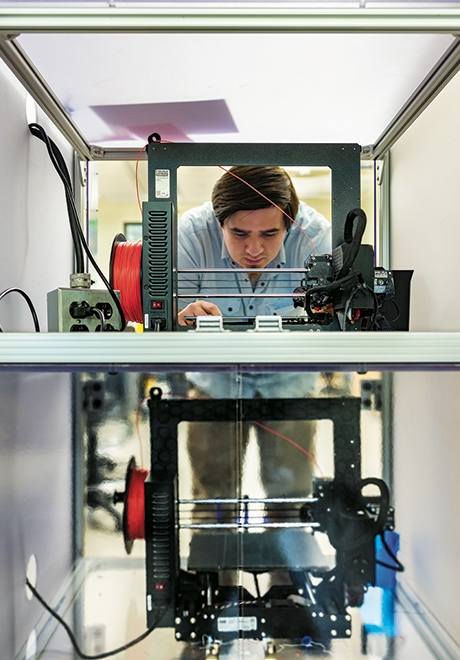
Julia Hill '24, a first-generation student majoring in psychology with a minor in biology, echoes the importance of Dartmouth's close community. "That makes a huge difference in being able to get to know your professors, get to know your peers, and have the opportunity to collaborate," she says. "And frankly, you get more opportunities than you necessarily have time for. It's almost a skill in itself to be able to say which doors you want to open, because, ultimately, all of them are open for you here."
SIMULATING BETTER HEALTH OUTCOMES
Dr. Anant Shukla was in his second year as an emergency medicine resident at Dartmouth Hitchcock Medical Center in 2022 and working as the senior resident on a shift in the ER when a critically ill patient was rolled in with a massive nosebleed. The patient's oxygen level was dropping rapidly, but he had so much blood in his airway that Shukla could not see his vocal cords in order to intubate him.
"I was unnerved by this," Shukla recalls. "It was very humbling." Shukla realized he had never seen that situation before, despite being a major in the U.S. Army who had served in combat in Afghanistan. He also realized that someone in a rural environment, a refugee camp, or a war zone might face a similar problem intubating a patient. "What about someone who is in the middle of nowhere?" Shukla wondered. "How could I teach them about this scenario?"
With encouragement from Dr. Matthew Roginski on DHMC's critical care faculty, Shukla secured funding from The Hitchcock Foundation and has worked with undergraduates at the DALI Lab for several years to create an augmented reality difficult airway intubation simulator. The simulator trains people on various intubation situations they might face—and provides immediate feedback on how they can improve.
Andrew Kotz '24, now the DALI team's tech lead on the project, joined the effort during the winter of his first year. "I'd say the most exciting thing about this is that we get an impossible task—and then we do it," says Kotz, a double major in computer science and engineering. He already has a job lined up at Apple after he graduates—but might like to launch his own startup one day.
The intubation simulator is one of about 15 concurrent projects at DALI, according to Tregubov. He says the experience for students to collaborate in small teams on cool projects, apply concepts they've learned in class, and turn an idea into something useful is a major motivator, even "life-changing." "All of a sudden they see that they've solved a problem. They see people's lives improved," Tregubov says.
For his part, Shukla says, "We have had exceptional students at DALI, who are absolute whiz kids, who know everything about programming. It's been an honor to work with them. We are really forging the edge here."
Karen Fortuna, an assistant professor of psychiatry at Dartmouth's Geisel School of Medicine, collaborated with Julia Hill '24 on a venture called RealVision. Hill presented their winning proposal at the Dartmouth Innovation Accelerator for Digital Health Awards last June. RealVision uses artificial intelligence to detect neuropsychiatric disorders such as Alzheimer's disease, Parkinson's disease, and schizophrenia in patients—years before they begin to show clear symptoms.
RealVision is rooted in the concept of participatory human-centered design, Fortuna explains. She and Hill partnered with family members and caregivers, who likely are the first to observe possible memory or cognitive loss, and integrated their ideas into the technology. "We bring in the patients as well," Fortuna adds. "That is where you create the next great discovery. They bring you ideas and insights that we never thought of before. Integrating the voice of the individual is really changing science and how it has traditionally been done. Really, the sky's the limit."
ENGINEERING A GREENER WORLD
As an undergraduate, Arianna Gragg '22 interned at Rondo Energy, a California startup that works on heat battery integration. The technology uses steam as a replacement for fossil fuel-fired boilers in large manufacturing centers and industrial parks. She now works full time at Rondo as an applications engineer and is thrilled to be tackling what she calls "the world's greatest challenge." Gragg majored in engineering with a minor in human-centered design. "I took cross-disciplinary courses in art. That mixed the analytical thinking with the fabric of who I am. Even in what I do now, I think it's critical to understand a human need before we go in and design processes. We need to ask, 'What are we designing for? What do people really want?'"
Gragg was a member of Women in Innovation at Dartmouth, and by senior year its vice president. She says the student club began on Zoom during the COVID-19 pandemic and centered on innovation and design thinking. With guidance from Sarah Morgan, senior program manager in experiential learning at Magnuson, the club later broadened its scope to drill into pragmatic questions about business and financing. "Dartmouth, holistically, is a great place to learn about startups and venture capital and entrepreneurship and technology," Gragg says. "You find your own niche."
As a first-year student, Vico Lee '24 competed in a hackathon, designing an app with classmate Elizabeth Frey '24 to promote recycling in his home country of Singapore. They won, but Lee was frustrated. "I realized I had no analytical skills as to whether this product would be something customers would use, whether it had any potential. Could I sell it in the long run? What about marketing? Sure, it's really cool to build a product, but what's the point if there's no market for it? Otherwise, it's just a waste of resources." Lee, who is majoring in computer science and physics, founded DartUP, a program at the Magnuson Center that provides student innovators with practical tools so they can take a deep dive into launching a startup. "It also reminds students that when they build teams, they need to bring in people with different talents and points of view," Lee says. Teams spend six months developing an entrepreneurial venture from scratch and compete for prizes.
Energy Pools, a fiber arts installation on display in the Irving Institute's atrium, exemplifies Dartmouth's commitment to confronting environmental challenges and working across disciplines. Created by film and media studies professor Jacque Wernimont, the piece uses recycled textile strands in colors that represent the various types of U.S. energy consumption and the changes needed for a sustainable energy future.
Dartmouth students have gone on to develop companies that tackle environmental problems in unusually creative ways. Matt Rothe '98 cofounded Blue Ocean Barns and developed a seaweed-based cattle feed supplement that makes cows belch less. That reduces the animals' methane emissions by a whopping 80 or even 90 percent, according to field tests. Marty Odlin '04, Thayer '07, who spent his childhood on fishing boats in Maine, engineered an idea to use kelp to trap carbon. His company, Running Tide, harvests kelp grown on buoys and then sinks these carbon-rich biomasses deep in the sea, where the carbon no longer adds to global warming. Ben Parker '16 worked as a mechanical engineer for Tesla before he cofounded Lightship, a San Francisco company working to bring electric vehicle technology to recreational vehicles. Within a week of opening for preorders last spring, Lightship had booked more than a year of production of the energy-efficient RVs.
Dartmouth also is a partner in the National Science Foundation's Interior Northeast Innovation Corps (I-Corps) Hub with nine other universities. I-Corps, which promotes innovation in predominately rural areas and provides free courses for STEM researchers and entrepreneurs, has provided funding support for numerous Dartmouth projects, including an open-source wastewater PFAS removal system developed by a team of four undergraduates and engineering students.
"The best and fastest way to create new knowledge and translate it into impact is by working together, learning together, problem-solving together."
- President Beilock
DESIGNING CHANGE FOR GOOD
Film and media studies professor Mary Flanagan wants to make the world a better place. She pushes people to think like children and ask questions. For example, could a video game help promote recycling? Combat bias? The answer is yes. In her Tiltfactor Lab, Flanagan has created commercial games that challenge how people view the world, measurably shift their perspective, and spur them to confront stereotypes. "We get used to putting a lot of brakes on ourselves about what's possible. For social change, persuasion, even public health—those areas need people who can think creatively, even playfully, about serious problems."
In her game design classes, Flanagan gives students prompts every week or two. One assignment was to rapidly prototype a game that would shape players' thoughts and raise awareness about extremism. "It could be political, or it could be religious," says Won Jang '26, a biomedical engineering major with a minor in human-centered design. An earlier assignment involved fake news, recalls Lydia Jin '26, who is double majoring in computer science and cognitive sciences.
Jang and Jin worked together on an extremism game, turning it into a murder mystery. "The way we approached it was by trying to allow an audience to get in the mind of someone who might become involved in extreme activities or cult behavior," Jin says. Together, they created fictional Google tools for the game's main character—including her Google searches, Gmail, photos, and calendar—which players could then look through, like detectives, to understand what motivated that behavior. Jin, who wants to pursue a career in game design, is interested in developing the game further.
Changing behavior lies at the heart of Balloon, a company Amanda Greenberg '07 cofounded in 2018 to help organizations avoid groupthink, promote franker discussions by inviting anonymous input, improve decision-making, and sharpen leaders' priorities and goals. An environmental studies major who had worked as a public health researcher, Greenberg realized that business meetings and processes didn't work effectively, nor did they address how people actually collaborate, share information, and make decisions.
Balloon got a jumpstart about five years ago when Greenberg won a pitch competition at the Dartmouth San Francisco Entrepreneurs Forum, and several alumni invested in her company, which now has clients such as Amazon, Estée Lauder, the Houston Astros, the Phoenix Suns, and Medtronic. "One thing that stands out about Dartmouth is the reception of the alumni community," Greenberg says. "Lots of doors open. It's just such a robust network." She credits her experience as an undergraduate with teaching her how to identify problems and to be persistent—qualities that have been key to her innovative company's success.
The College continues to broaden and enrich the vast array of meaningful learning experiences it offers students, instilling in them the confidence to pursue their own innovative ideas, launch themselves into careers that pursue new frontiers, and forge breakthroughs that will improve the human condition and the health of our world.
"The best and fastest way to create new knowledge and translate it into impact is by working together, learning together, problem-solving together," President Beilock remarked at the close of her inauguration speech. "Solutions to make the world a better place are out there; we just need to accelerate their development and apply them more broadly. And I have every confidence that we can."
Photographs by Don Hamerman




